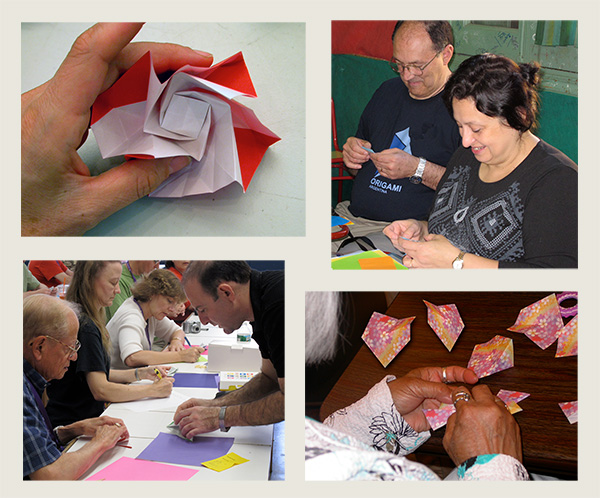Can folding paper in the process of making Origami benefit our health? If you ask someone who is engaged with this art the answer will most likely be a confident yes.
A 2010 article published by the AARP––The American Association of Retired Persons–– Boost Your Brain Health, suggests a number of things we can do to maintain healthy brain function as we age. One idea is participating in activities that challenge us to deeply engage with an interest we might have. Such focus helps us build new brain cells which in turn strengthens our cognitive function.
For many, Origami is such a subject. It is an activity that provides both mental and physical stimulation, engages the mind, cultivates concentration, and develops fine motor skills and hand-eye coordination. Paper folding challenges us at the cognitive level as we follow instructions to learn a model. Memory, non-verbal thinking, attention, 3D comprehension, and imagination are further stimulated as the brain explores and analyzes any Origami model whether simple or complex.
Origami is a very relaxing activity, and that relaxation is very good medicine. Physically, as our hands become active, tactile, motor and visual areas of the brain are stimulated which soothes us, and helps us rest mentally and physically. For this reason, Origami is useful in therapeutic settings such as for stroke and injury rehabilitation.
No matter how many times a model is made, emotional satisfaction is derived as a byproduct of the work. Watching a piece of paper transform into something tangible, a new creation by our own hand, one which is often given away as a gift to a friend, a stranger, or a loved one, produces a measure of joy in the giver and receiver that is also very good medicine.
Related Posts:
- How a Paper Heart can Help You Stay Healthy
- Origami Art Therapy for Mental Health
- Recovering Health Through Origami
- The Smile of Mona Lisa
- Dr. Lizzie Burns Uses Origami in her Anti-Boredom Campaign
- Origami – A Help to Alzheimer’s Patients
- Stay Calm and Make an Origami Ladybug
- All That’s Worth Cherishing Begins in the Heart
- Yuko Taniguchi – Creative Activities for Healing
Articles
- Boost Your Brain Health. (P. Murali Doraiswamy – AARP Magazine)
- What happens when we make Origami?(Rachel Katz)
- The Educational Benefits of Origami (George Levenson)
- Origami and Child Development (New World Encyclopedia)
- Health Benefits of Origami (Origami Resource Center)
- A Bibliography of Origami in Education and Therapy (John Smith)
- Celebrate small victories (and self-love) with origami (Mallary Tenore Tarpley, LA Times)
- Jun Hamamoto Teaches Origami at San Quentin State Prison (Kimberly Olsen, Diablo Magazine)
- Utilizing Creativity for Adolescents’ Recovery in Inpatient Psychiatric Hospital (IPH) (Yuko Taniguchi)





Origami has brought back the feeling in my fingertips!
HI, not sure if this page is still active, would you say origami helps with rehabilitating so-called ‘naughty kids’, those who struggle with school as they are misunderstood?
Thanks
Hi Leyla,
Do you do stop motion videos?
Hi Andrew,
I have made stop-motion videos occasionally. See the following:
https://www.origamispirit.com/2014/05/st-george-and-dragon/
https://www.origamispirit.com/2012/08/the-banquet/
https://www.origamispirit.com/2012/10/halloween-and-the-perfect-candy-corn-dish/
Hi, my name is Venice, and I’m a fifth grader from Koloa Elementary school and was wondering if I can use this article to write an assignment I chose to do, and my question is:How might I use origami to calm down?
Hi Venice,
You can use this article as a reference, of course mentioning your sources and the author.
By its nature, origami is a peaceful and meditative practice. If you begin by learning a few simple models, origami can be used as an aid to calm down. Learn the folds by heart and make several of them thinking of people or occasions you might want to celebrate and share with. Make origami a practice for yourself and also to share with others.
Also, you might want to read this article on how origami is used as therapy for patients suffering from mental illness: https://www.origamispirit.com/2016/05/origami-for-mental-health/
thanks for helping me with an argument that will happen in two days.
I wanna have some knowledge about the relation between Origami and STEM education for junior and senior students because i am in the way to make research paper for that subject.
if some references or internet sits available i will be thankful.
with my best wishes.
Saeed
Hi Saeed,
At the moment I don’t have the references and information you need regarding origami and STEM, but if I come across with something I will let you know.
Thank you for your interest.
Hello, I am trying to do a science project on, does origami help with stress. I got some question I’d like answered if you have time.
What are other ways origami help with stress, other than the feeling of satisfaction?
What type of folds seem to release the most amount of stress or what type of origami release the most amount of stress after finishing it, it can’t be too hard or too easy or it wouldn’t be much satisfaction?
Hi Arthur,
You will find answers to your question about origami and stress in the following article:
https://www.origamispirit.com/2018/12/does-origami-help-with-stress/
Thank you for your question!
Hello! I am doing a research project on origami, and I need to put this article in my bibliography. Do you remember what date this was published on/where I can find that info?
Hi Raha, this article was published in January of 2011.
Hi I am Jeremiah a 6th grader from Parkside Jr high, Normal, IL I am doing a Feature Article and is it OK to use this website for my article and does Origami help with Anxiety?
Hi Jeremiah!
Of course you can use information found in this website as a reference to write your article. Just make sure that you credit to all your sources in your paper.
Most people who practice origami do it for fun and as a way to relax and play. But origami as a practice has shown to relieve anxiety and other mental negative conditions. You can read more here:
Origami Art Therapy for Mental Health https://www.origamispirit.com/2016/05/origami-for-mental-health/
Health Benefits of Origami (Origami Resource Center): https://www.origami-resource-center.com/health-benefits.html
Thanks for letting my reference this website and others
I need to know if this information is available in Spanish. Also I need to know if phycholists can use the technique to try violence in children. Please help
Hi Elba, on the side bar there is a link to the Google translation tool. It will translate this website into Spanish. Not perfectly but adequate.
I don’t have experience with origami as a technique to help reduce violence in children. I don’t know wether it would work or not.
Hello, I was hoping you could answer a question for my paper. Do you know if there are any negative side effects that origami has on the psychology of a person? Please respond as soon as you can. Thank you
HI James,
I haven’t heard of any negative side effects of origami on people.
Hello Ms. Torres, I love your YouTube videos. I am a child psychotherapist working in NJ. Over time, I have utilized origami as a therapeutic tool for my clients. It is a hobby of mine that sort of turned into a therapeutic tool to help my clients with problems with attention, concentration, following directions, patience, and self-expression. I want to know if you have any suggestions for me in terms of making it a formal workshop/training. I know you have experience with teaching origami. I suppose I have a lot of ideas for how I can expand this knowledge to clients and other professionals and wanted to know if you can give me any ideas as I have no formal experience. Thank you!
Hi Maria,
Even if you have no “formal” experience, the experience that you have gathered through your work will be enough if you see that what you do can help people overcome their challenges. Start with a modest plan, implement it and take it from there.
I would say you need to define your audience to the best of your ability. Write a list on how origami can help them with their challenges. Based on your experience teaching your clients, choose at least one model that can help with each item in your list. Define three to five short activities for your workshop or training session. Write up and share your offer with people who might be interested.
I hope this helps you with your question.
Leyla
Ms. Torres,
Thank you for your feedback! I find it very helpful and will implement the strategies you suggested. Do you have any suggestions for resources I can use that you trust in terms of books, etc. My client range is from age 5-21 (I also have adults aged 23-46 who have developmental deficits). You are an inspiration and I have used a lot of your videos to help my clients. I want to thank you for your work.
I have reviewed some instructional origami books that might be helpful to you.
These are good for teachers:
https://www.origamispirit.com/books/#teachers
and these are good for beginner paper folders of all ages:
https://www.origamispirit.com/books/#beginning
Thank you soo much, Ms. Torres! I appreciate it!
i love this website it is very helpful i used it for a project in school for health benifits thanks so much every thing is correct and i totally agree
I would love to link your website to my mine to show proof of how folding origami is good for your brain. I would like to see more parents use origami with their children. I do origami every Friday with my students because they enjoy it so much. I plan of creating origami s with our local daycare children soon.
Hi Rhoda,
You are welcome to link to any article on my website. I’m glad it can be of help to you. Cheers! Leyla